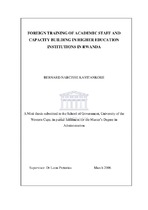| dc.contributor.advisor | Pretorius, Leon G. | |
| dc.contributor.author | Kayitankore, Bernard Narcisse | |
| dc.contributor.other | School of Government | |
| dc.contributor.other | Faculty of Economics and Management Sciences | |
| dc.date.accessioned | 2013-08-14T12:20:09Z | |
| dc.date.available | 2007/06/19 06:32 | |
| dc.date.available | 2007/07/03 | |
| dc.date.available | 2013-08-14T12:20:09Z | |
| dc.date.issued | 2006 | |
| dc.identifier.uri | http://hdl.handle.net/11394/1918 | |
| dc.description | Masters in Public Administration - MPA | en_US |
| dc.description.abstract | During the 1994 genocide in Rwanda, not only physical assets were eroded but more importantly, human capital were destroyed and left the country living hardly on qualified personnel at almost all levels of the economy to play a meaningful development role. While capacity building is needed in many sectors of the economy, it is especially important in the education sector. This study focuses on one particular issue namely to what extent sending academic staff for training in foreign countries can effectively contribute to capacity building in Rwandan higher education institutions (HEI). Various options exist to improve a strategy to build capacities in higher education institutions; amongst others is the training of human resource which is the most important of all. In order to investigate the above, both qualitative and quantitative methods were used. Techniques such as documentation, semi-structured interview, questionnaire and direct observation were also used in order to reach the research objectives. With regard to the main question of this study, findings reveal that funding academic staff for foreign training is believed to effectively contribute to capacity building in Rwandan higher education. As respondents explain, academic staff sent for training in foreign countries acquires new knowledge that is needed to build the country. This gained knowledge is spread all over the country through teaching at universities where most sectors of the country find their human resources. Being open minded, trained academic staff will be able to update his knowledge and therefore train in turn his students accordingly. However, findings inform also that Rwandan HEI are faced with multiple problems amongst others the problem of defining the real institutional needs for appropriate training. In this regard, findings suggest that for the training to be effective in Rwandan HEI there is a need of putting in place appropriate mechanisms and assessing institutional needs before training a person and training according to those specific needs in order to help the process of capacity building being more effective. | en_US |
| dc.language.iso | en | en_US |
| dc.publisher | University of the Western Cape | en_US |
| dc.subject | Education | en_US |
| dc.subject | Higher - Rwanda | en_US |
| dc.subject | College teachers | en_US |
| dc.subject | Training of - Rwanda | en_US |
| dc.subject | Aims and objectives | en_US |
| dc.subject | Finance | en_US |
| dc.title | Foreign training of academic staff and capacity building in higher education institutions in Rwanda | en_US |
| dc.type | Thesis | en_US |
| dc.rights.holder | University of the Western Cape | en_US |
| dc.description.country | South Africa | |

